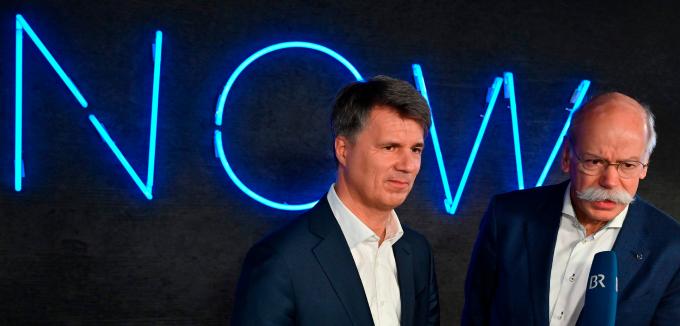AFP
Together against Uber, Google and Co: BMW boss Harald Krüger and Daimler CEO Dieter Zetsche (r.) In Berlin
In the hip Berlin location, there are modern wire furniture, concrete walls and sushi burritos. The automobiles of Daimler and BMW, Dieter Zetsche and Harald Krüger, despite their start-up flair, prefer to wear traditional-blue suits. In an old subway tunnel on Potsdamer Platz, the CEOs have on Friday the plans for their new joint mobility company Share Now presented. The unit is to unify digital offerings such as car sharing and rideshare services and make the corporations stronger against increasingly powerful competition from the digital sector.
Like five joint ventures, Daimler wants Show stock market chart and BMW Show stock market chart ensure in the future that they do not lose touch with modern mobility. Among others, they are pooling their car sharing offerings Car2Go and Drive Now under the name Share Now. A total of 14 brands with around 60 million customers will be integrated, and 1000 new jobs will be created worldwide.
The top managers leave no doubt that the whole thing should be really big. “We are creating a world-leading game changer,” said BMW boss Harald Krüger on Friday. But: “Growth is mandatory,” says Daimler-Boss Zetsche.
After all, the companies are still counting the turnover of their new offering at only around three billion euros. That is not very much in terms of total revenue: Daimler generates around € 167 billion and BMW just under € 99 billion. But the trend is clear: fewer and fewer people buy their own cars. Younger generations in particular are increasingly coping without their own driver’s license – also through mobility services from Silicon Valley and China. “If you see change, but avoid tackling it, then you’re lost,” Zetsche explained the change of heart of his former rivals.
The autobuses keep themselves covered
Krüger formulated clear expectations for the new managers of the units: “That they deliver.” But the CEOs did not seem to want to lean too far out of the window with forecasts. When asked about sales targets, the joint venture executives were now working on business plans that would be re-evaluated in three to four months. Future investments depended on how well you could grow.
Initially, Daimler and BMW have turned over one billion euros for the five companies. Zetsche and Krüger did not comment on how long the money should last (Zetsche: “Until she’s gone.”). Other questions remained open: for example, whether the new construct should be listed on the stock market in order to open it to more investors.
“The teams have only been allowed to talk to each other for three weeks,” says BMW CFO Nikolaus Peter. Due to regulation, A sentence that could be heard from many sides on Friday. It is more likely that BMW and Daimler do not want to see through any details. Because not only competition through multi-billion dollar start-ups like Uber exerts pressure. VW also wants in the second quarter of 2019 Launch your own carsharing service, And the car rental company Sixt – once a major shareholder of Drive Now – wants a complete one already next week new mobility offer imagine.
Daimler and BMW hope to outdo the competition by joining forces. Synergies are to be created and costs to be saved. The size should make the business more profitable. The plan includes:
The development of the mobility platform called Reach Now, which will be headed by Daniela Gerd tom Markotten. It should allow users to plan their way around the city and book all sorts of mobility solutions – from public transport to rental bikes, e-scooters and cars. To make the offer as comprehensive as possible, competitors should also have the opportunity to be integrated. The joint venture includes the similar Daimler range Moovel and BMW Reach Now, which was mainly used in the USA.
Charge Now sums up more than 100,000 charging stations in an app electric cars composed of 250 operators in 25 countries. In Europe, the integration of new charging station operators could increase, said Charge Now CEO Jörg Reimann. “The growth is challenging, but once it’s done, the position can be well defended.” He now directs his gaze to the US and China, where he expects massive developments.
Reimann also manages the joint venture Park Now. Customers should be able to find and pay for parking spaces. “Both are software companies, we are very asset-oriented,” says Reimann. You do not own parking lots or houses. Park Now earns either at the booked parking lots or by contracts with cities.
The ride-hailing offer, in which, for example, the taxi call app MyTaxi is integrated, is now called Free Now. In addition to taxis and rental cars and e-scooters can be ordered. Managing Director Marc Berg sees strong growth in Latin America, but he does not plan to move into the US.
20,000 vehicles in 31 cities can now offer the car sharing joint venture of the companies, Share Now. Since today, users of Car2Go or Drive Now see the vehicles of the other brand in their app. In a few weeks, the programs should be fully integrated.
Although the threads at Reach Now should converge as an overarching platform. Officially, however, the joint ventures stand side by side on an equal footing. In the case of a dispute this could mean elaborate collusion and negotiations. Daniela Gerd tom Markotten says: “So far, we have always agreed.” And in doubt, the shareholders would decide. Given the competitive situation, they should first pull together again.

